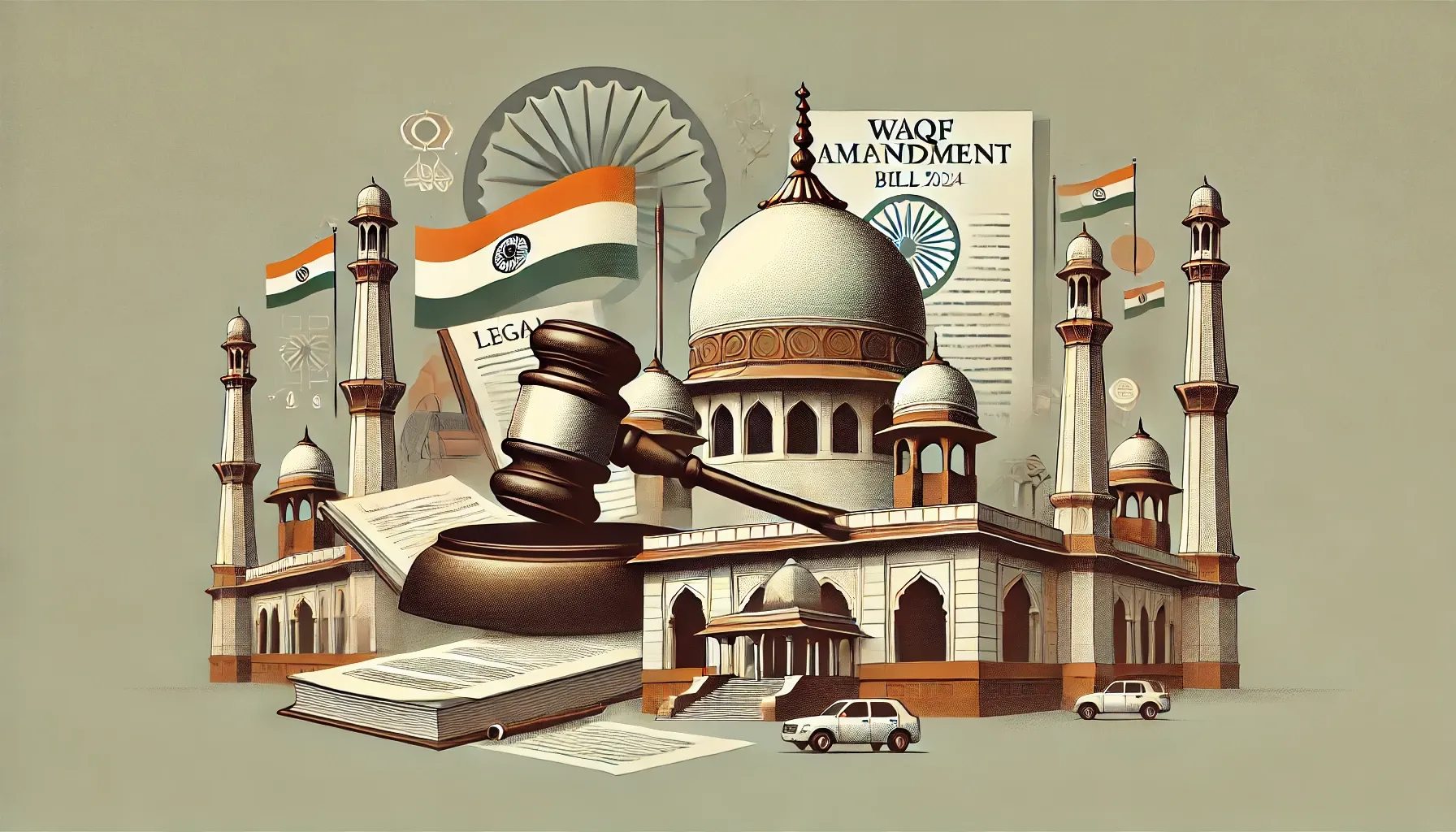India’s so-called secularism, long touted as the bedrock of its democracy, is crumbling under the weight of the Modi government’s Hindu nationalist agenda. The latest assault on the country’s Muslim minority comes in the form of the Waqf Bill 2024. This legislative maneuver aims to tighten government control over Waqf properties—charitable endowments that have been integral to the Muslim community for centuries.
While the government has yet to announce a specific timeline for the bill’s presentation in Parliament, its intent is unmistakable. The bill seeks to strip India’s Muslims of their control over these sacred sites and institutions. This leaves them at the mercy of an increasingly hostile state apparatus. The fears and anxieties this bill has generated within the Muslim community are not mere paranoia. They represent a rational response to a systematic campaign of marginalization and oppression that has been intensifying under the current regime.
Erosion of Autonomy
The historical significance of Waqf properties in India cannot be overstated. These endowments have served as the backbone of the Muslim community’s religious, educational, and social infrastructure for centuries. Waqf properties fund mosques, madrasas, orphanages, and hospitals, playing a crucial role in preserving the cultural and religious identity of Indian Muslims. These properties have also been a source of empowerment, allowing the community to sustain itself independently of state support.
However, the Indian government’s history of interference in Waqf affairs is as old as the country itself. From the colonial era to the present day, successive governments have sought to exert control over these properties. This has often led to their mismanagement and the erosion of community trust. The Waqf Bill 2024 is the latest chapter in this long history of state-sponsored encroachment. By centralizing authority and reducing the autonomy of local Waqf boards, the bill threatens to further weaken the structures that have sustained the Muslim community for generations.
Waqf Bill 2024: Undermining Muslim Community Control
The Waqf Bill 2024 introduces several alarming provisions that pose a direct threat to the integrity and autonomy of Waqf properties. One of the most troubling aspects of the bill is its introduction of increased government oversight. This oversight effectively diminishes the community’s control over Waqf properties. Local boards and trustees have managed these properties, understanding the unique needs and priorities of their communities. The bill’s provisions threaten to replace this localized management with a top-down, bureaucratic approach. This approach disconnects from the realities on the ground. The loss of autonomy is particularly concerning given that these properties are not just assets. They are central to the religious and social functions of the Muslim community. The fear is that government control will lead to the repurposing or even confiscation of these properties. This would further erode the community’s ability to sustain itself.
The bill proposes the establishment of a central Waqf tribunal under the Indian government. It also advocates for a more centralized Waqf board system. This centralization is a blatant attempt to dilute the influence of local Waqf boards and trustees. Historically, these local boards and trustees have been the custodians of these properties. By shifting control to a central authority, the bill undermines local governance. This shift paves the way for bureaucratic inefficiencies and potential misuse of authority. Authoritarian regimes hallmark the centralization of power. In this case, the government uses centralization to further marginalize a minority community that is already under siege.
Cultural Deterioration
Waqf properties are not merely pieces of land. They are the lifeblood of the Muslim community, supporting a wide range of religious, educational, and social activities. The proposed changes in management and control threaten to disrupt these activities. This disruption could potentially lead to the collapse of vital community services. Waqf properties could cause financial difficulties for mosques. They might also force madrasas to close and severely curtail social services. The impact on the community would be devastating. This devastation would not only involve lost services but also result in a psychological and cultural blow to a community that is already grappling with rising Islamophobia and state repression.
Legal Concerns
While the bill claims to improve oversight, history tells us that increased government control often leads to the opposite: mismanagement and corruption. The Indian bureaucracy is notoriously slow and opaque. There is little reason to believe that it would handle Waqf properties any differently. Instead of streamlining operations, the bill is likely to introduce new layers of red tape. This red tape would make it even harder for Waqf boards to operate effectively. Worse still, the increased oversight could create more opportunities for corruption. Officials may seek to exploit their new powers for personal gain. The result would be a further decline in the effectiveness of Waqf administration. This decline would exacerbate existing challenges and undermine the community’s ability to manage its own affairs.
The bill includes provisions for resolving disputes related to Waqf properties through legal channels. While this might seem like a reasonable approach on the surface, it raises several concerns. Legal battles over property disputes can drag on for years, if not decades, and the outcome is often uncertain. Many fear that these disputes will resolve unfavorably for Waqf institutions, especially if political pressures sway the judiciary. Given the current climate of anti-Muslim sentiment in India, the legal system poses a real risk of being used as a tool to further dispossess the Muslim community of its assets.
Cultural Erosion
One of the most glaring deficiencies of the Waqf Bill 2024 is its failure to ensure adequate representation of Muslim communities in the decision-making processes regarding Waqf properties. The bill centralizes power in the hands of a few, leaving little room for local voices to be heard. This lack of representation is not just a procedural issue; it is a fundamental violation of the community’s rights. Without a seat at the table, the Muslim community has no way to influence decisions that directly affect its religious and cultural institutions. The fear is that the government will make decisions that are misaligned with the community’s needs, leading to outcomes that are detrimental to the preservation of Muslim heritage in India.
Waqf properties are not just functional assets; they are also repositories of history and culture. Many Waqf properties have historical and cultural significance, serving as symbols of the Muslim community’s contributions to India’s rich heritage. The fear is that changes in management might lead to the alteration or even destruction of these properties, erasing important aspects of Muslim history. This concern is not unfounded, given the current government’s track record of rewriting history to fit its Hindu nationalist narrative. The government could use the Waqf Bill 2024 as a tool to further this agenda, systematically dismantling the physical and cultural symbols of Muslim identity in India.
Impact on Muslim Community Well-Being
The Waqf Bill 2024 is poised to have devastating effects on the Muslim community in India. The erosion of control over Waqf properties will not only undermine religious freedom. It will also destabilize the social and economic foundations that these properties support. By centralizing authority and reducing community involvement, the bill threatens to sever the ties between Waqf institutions and the people they serve. The likely outcome is a weakened community. This community will struggle to maintain its religious practices and cultural heritage in the face of increasing state oppression. The psychological impact cannot be underestimated. As Muslims in India see their sacred sites and institutions taken over by a government that has consistently shown hostility towards them, they will feel increasingly alienated and marginalized. This sense of alienation could lead to further social unrest, as the community fights to protect its rights and heritage.
The bill also has broader implications for the Muslim community’s economic well-being. Many Waqf properties generate income that supports a wide range of community services, from education to healthcare. By disrupting the management of these properties, the bill could cut off a vital source of funding for these services, leaving the community even more vulnerable. The loss of income would also have a ripple effect, impacting not just the direct beneficiaries of Waqf-funded services but also the wider community that relies on these services for their well-being. In short, the Waqf Bill 2024 is a direct attack on the socio-economic fabric of the Muslim community in India.
Also See: Political Playbook of India: Fear, Identity, and the Vote
A Tool for Marginalization
The Waqf Bill 2024 is not an isolated incident. It is part of a broader strategy by the Modi government to marginalize religious minorities and promote a Hindu nationalist agenda. From the Citizenship Amendment Act (CAA) to the National Register of Citizens (NRC), the Indian government’s policies have consistently targeted Muslims. These policies erode their rights and freedoms. The Waqf Bill is yet another tool in this campaign. It is designed to dismantle the structures that sustain Muslim life in India. By centralizing control over Waqf properties and reducing community involvement, the bill sets a dangerous precedent. This precedent paves the way for further encroachments on the rights of religious minorities.
The broader implications for religious freedom in India are dire. The Waqf Bill 2024 could pave the way for similar legislation targeting other religious minorities, further eroding the country’s secular fabric. It also sends a clear message to the Muslim community that they are not welcome in Modi’s India, that their rights and freedoms are expendable in the pursuit of a Hindu nationalist state. This is a dangerous path, not just for India’s Muslims but for the country as a whole. By marginalizing religious minorities and undermining the principles of secularism, the Indian government is sowing the seeds of division and conflict that could tear the country apart.
Urgent Call for Global Action
The international community, particularly the Muslim world, cannot afford to remain silent in the face of India’s escalating repression of its Muslim population. The Waqf Bill 2024 should be a wake-up call for global leaders to condemn these actions and hold India accountable for its violations of religious freedom. Diplomatic and economic pressure should compel the Indian government to halt its assault on Muslim rights with impunity. Failure to act will not only embolden India’s government but also set a dangerous example for other nations that may seek to marginalize their religious minorities.
The Waqf Bill 2024 represents a direct and dangerous threat to the religious freedom and cultural heritage of India’s Muslims. The government wields this legislative weapon to weaken the community’s control over its sacred sites and charitable institutions, all under the guise of administrative reform. The bill is part of a broader campaign by the Modi government to marginalize religious minorities and promote a Hindu nationalist agenda that is fundamentally at odds with India’s secular traditions.
The Muslim community, civil society, and international stakeholders must unite in opposition to this bill, as it is not just an attack on Waqf properties but on the very identity and existence of Muslims in India. The time to act is now, before India’s so-called democracy erases yet another piece of its secular identity. Pakistan, in particular, must take the lead in raising awareness of this issue and in advocating for the rights of India’s Muslims. By doing so, it can help to protect the religious freedom and cultural heritage of one of the world’s most vulnerable communities.



![Truck traveling along the Makran Coastal Highway in Balochistan, with rugged cliffs and the Arabian Sea coastline in the background [Image via Getty Images].](https://southasiatimes.org/wp-content/uploads/2026/02/Balochistan-2.webp)


![Afghan men search for victims after a Pakistani air strike hit a residential area in the Girdi Kas village, Nangarhar province on February 22, 2026. [Aimal Zahir/AFP/Getty Images]](https://southasiatimes.org/wp-content/uploads/2026/02/gettyimages-2262391441.webp)
